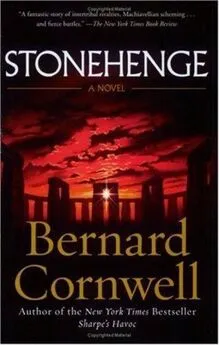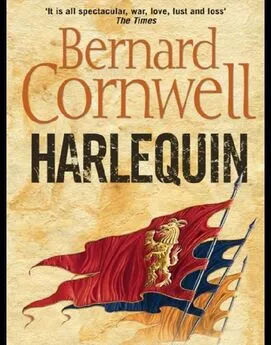Bernard Cornwell - Stonehenge
- Название:Stonehenge
- Автор:
- Жанр:
- Издательство:неизвестно
- Год:неизвестен
- ISBN:нет данных
- Рейтинг:
- Избранное:Добавить в избранное
-
Отзывы:
-
Ваша оценка:
Bernard Cornwell - Stonehenge краткое содержание
Bernard Cornwell's new novel, following the enormous success of his Arthurian trilogy (The Winter King, Enemy of God, and Excalibur) is the tale of three brothers and of their rivalry that creates the great temple. One summer's day, a stranger carrying great wealth in gold comes to the settlement of Ratharryn. He dies in the old temple. The people assume that the gold is a gift from the gods. But the mysterious treasure causes great dissension, both without from tribal rivalry, and within. The three sons of Ratharryn's chief each perceive the great gift in a different way. The eldest, Lengar, the warrior, harnesses his murderous ambition to be a ruler and take great power for his tribe. Camaban, the second and an outcast from the tribe, becomes a great visionary and feared wise man, and it is his vision that will force the youngest brother, Saban, to create the great temple on the green hill where the gods will appear on earth. It is Saban who is the builder, the leader and the man of peace. It is his love for a sorceress whose powers rival those of Camaban and for Aurenna, the sun bride whose destiny is to die for the gods, that finally brings the rivalries of the brothers to a head. But it is also his skills that will build the vast temple, a place for the gods certainly but also a place that will confirm for ever the supreme power of the tribe that built it. And in the end, when the temple is complete, Saban must choose between the gods and his family. Stonehenge is Britain's greatest prehistoric monument, a symbol of history; a building, created 4 millenia ago, which still provokes awe and mystery. Stonehenge A novel of 2000 BC is first and foremost a great historical novel. Bernard Cornwell is well known and admired for the realism and imagination with which he brings an earlier world to life. And here he uses all these skills to create the world of primitive Britain and to solve the mysteries of who built Stonehenge and why. 'A circle of chalk, a ring of stone, and a house of arches to call the far gods home'
Stonehenge - читать онлайн бесплатно ознакомительный отрывок
Интервал:
Закладка:
There was no temple in sight, but Camaban guessed it lay somewhere in the thick fog beneath and so he sat on a stone ledge to wait. Saban paced up and down, then asked Camaban, 'Why would we want Scathel's temple if Scathel is an enemy?'
'He's no enemy of mine.'
Saban sneered at that. 'Then what is he?'
'He's a man like you, brother,' Camaban said, 'a man who hates things to change. But he is a good servant of Slaol and in time he will be our friend.' He turned and looked eastwards where the peaks of other mountains stood like a line of islands above the whiteness. 'Scathel wants Slaol's glory, and that is good. But what do you want, brother? And don't say Aurenna,' he added, 'for she'll be dead soon.'
Saban blushed. 'Who says I do want her?'
'Your face says so. You stare at her like a thirsty calf gazing at an udder.'
'She's beautiful,' Saban said.
'So was Derrewyn, but what does beauty matter? In a dark hut at night, how can you tell? Never mind, tell me what you want.'
'A wife,' Saban said, 'children. Good crops. Plentiful deer.'
Camaban laughed. 'You sound just like our father.'
'And what's wrong with that?' Saban asked defiantly.
'Nothing is wrong with that,' Camaban said wearily, 'but what a little ambition it is! You want a wife? Then find one! Children? They come whether you want them or not, and half will break your heart and the other half will die. Crops and deer? They're there now.'
'So what do you want?' Saban asked, stung by his brother's scorn.
'I told you,' Camaban said calmly. 'I want everything to change, and then nothing will change, for we shall reach the point of balance. The sun won't wander and there will be no more winter and no more sickness and no more tears. But to do that we must make Slaol a proper temple, and that is what I want. A temple that does Slaol honour.' With those words he suddenly fell silent and stared, wide-eyed, into the fog beneath, and Saban turned to see what had attracted his brother's attention.
At first he could only see fog, but then, slowly, as the land appears when the night drains, a shape emerged in the whiteness.
And what a shape. It was a temple, but unlike any Saban had ever seen. Instead of one circle of stones it had two, one set inside the other, and at first Saban could only see the dark tips of those stones in the vapour. He tried to count the pillars, but there were too many, and at the double circle's farther side, looking towards the place on the skyline where the winter sun would set, there was an entrance made from five pairs of stone pillars that had other stones laid crosswise on their tops to make a row of five doorways for the dying sun. Saban stared, and for a magical time the whole temple seemed to float in the vapour and then the fog drained from the high valley to leave the stones rooted in the dark earth.
Camaban was standing now, his mouth open. 'Scathel was not mad,' he said quietly, then he gave a cry and leaped off the rocks and hurried down the hill, scattering dark-fleeced sheep as he went. Saban followed more slowly, then edged between the twin rings of stone to find Camaban crouched at the temple's north-eastern side where he was peering into the tunnel made by the lintelled stones. 'Slaol's gates,' Camaban said in wonder.
The temple was built in a high hanging valley that overlooked the low country to the south and, at midwinter, when the sun was on that far horizon, it would shine across the sea and land to pierce the gates of stone. 'All else would be dark,' Camaban said softly, 'all would be shadowed by the stones, but in the shadow's centre would be a shaft of light! It's a temple of shadows!' He hurried to the stone opposite the entrance and there, facing the sun's gateway, he spread his arms and flattened himself against the rock as though the light of the dying sun was pinning him to the boulder. 'Scathel is magnificent!' he cried. 'Magnificent!'
The pillars, naturally square, were not large. Those in the sun's gate were a little taller than Camaban, but the rest were shorter than a man and some were no higher than a toddling child. All the rocks had been prised or lifted from the shattered mountain top and slid down the steep slope to this flat patch of high hanging land where they had been shallowly rooted in the thin soil. Saban pushed against one stone and it rocked dangerously. The stone against which Camaban stood was actually two pillars, both too thin, but they had been joined together by carving a groove in one long side and sculpting a tongue in the other so that the two stones fitted like a man fits to a woman. 'Two halves of the circle,' Camaban said reverently, noticing the jointed stones. 'The sun side' — he gestured to the south, indicating the stones over which the sun would travel in its daily path — 'and the night side, and they're joined here, and the joint must be sealed with blood at the sun's dying.'
'How do you know?' Saban asked. He had been counting the stones, and had already numbered more than seventy.
'How else?' Camaban asked curtly. 'It's obvious.' He whirled around in his excitement. 'The Sea Temple for midsummer and the Temple of Shadows for the winter! Scathel is marvellous! But this one will be ours. It will be ours!' He began walking around the circle, cracking his staff against the stones until he reached the lintelled gate where he stooped to gaze through the tunnel of five stone arches. 'A doorway for Slaol,' he said in wonder, then straightened and wiped the nearest stone. The fog's moisture had left the rocks with a strange blue-green sheen that began to fade to black as the spring sun and the sea wind dried them. Camaban, to Saban's horror, tried to push one of the lintels as if hoping to topple it, but it would not move. 'How do they fix it?' he asked.
'How would I know?'
'I don't suppose you would,' Camaban said carelessly, then frowned. 'Did I tell you Sannas is dead?'
'No.' Saban was oddly shocked, not because he had any fondness for the old woman, but because as long as he had lived she had been a part of his world, and not just any part, but a forbidding presence. 'How?' he asked.
'How would I know?' Camaban retorted. 'She just is. A trader brought the news, and she was an enemy of Slaol so it's good news.' He turned to gaze again at the temple. Now, freed of the fog's moisture, it was a black double ring in a black valley crouched in the mountain's black-rocked grip. It was wide and splendid, a mad priest's tribute to his god, and Camaban had tears in his eyes. 'It is our temple,' he said reverently, 'and it will banish winter.'
Somehow they had to persuade Scathel to let them take it, then carry it halfway across the world to Ratharryn.
The thick fog that had shrouded the Temple of Shadows gave way to days of warm sun and calm winds. Old folk marvelled at that early summer, saying they could not remember its like, while Kereval claimed that the weather's kindness was a sign of the sun god's approval of his new bride. Some of the fishermen, who kept a small salt-reeking hut beside the river where they made offerings to a weather god called Malkin, made dire prophecies of storms, but day after day their pessimism was confounded. Kereval's favourite sorceress, a blind woman who uttered her wisdom while in the throes of violent fits, also predicted storms, but the skies stayed stubbornly clear and the winds light.
Kereval's feared warriors made their summer raids into the neighbouring territories to bring back slaves and livestock; traders came from the land across the western sea bringing gold; and the growing crops greened the land. All was well in Sarmennyn, or should have been, except that when Camaban and Saban returned to Kereval's settlement they found the folk sullen.
It was Scathel's return that had soured Sarmennyn. The high priest raged and preached against Kereval's agreement with Ratharryn, claiming that Lengar would never return the treasures unless he was forced and so, while Camaban and Saban were travelling with Aurenna, the high priest had dug a monstrous hole in front of Kereval's hut and placed above it a lattice of stout branches so that the pit could serve as a prison-cage for Saban. There Scathel could torture Saban, confident that every mutilation would be magically visited on Lengar, but Scathel's hopes were frustrated by Kereval who refused to give his permission. Kereval stubbornly insisted that Lengar would return the treasures and the chief liked to point to the bright sky and ask what better omen the tribe could wish. 'The god loves his bride already,' Kereval claimed, 'and when she goes to him, he will reward us. There is no need for the brother magic to be used.'
Yet Scathel constantly preached the need for Saban's eyes to be gouged out and for his hands to be lopped off. He toured the huts inside the settlement and visited the homesteads that lay within a half-day's journey and he harangued Sarmennyn's people, and the folk listened to him. 'Ratharryn will never take a temple from us!' Scathel ranted, 'Never! The temples are ours, built by our ancestors, made from our stone! If Ratharryn wants a temple, let them pile their own dung and bow to it!'
'If your brother were to send us some of the gold, it would help,' Kereval told Camaban wistfully, but Camaban shook his head and said that that had never been part of the agreement. The gold would come, he said, when the temple was moved, though he took care not to say that it was Scathel's own shrine he wanted for the tribe's passions were already running too high. Kereval did his best to calm the growing anger. 'Folk will calm down when they see the sun bride go in her glory,' the worried chief assured Saban.
Day after day Saban would visit the sun-bride's temple and watch the shadow of the tall outlying stone. He feared that shadow, for it crept ever closer to the centre stone, and when the shadow touched the stone Aurenna must go to the flames. Aurenna herself avoided the temple, as if by ignoring the shadow she might lengthen her life; instead, in those days as she waited for her wedding, she was drawn to Haragg. 'When you go to your husband,' he would tell her, 'you must persuade him to stop the waste. He must reject the brides!' But Haragg could no more persuade the tribe to abandon their yearly sacrifice than Kereval could persuade them that Lengar would keep faith, so Aurenna would have to die. As the days grew longer she spent more time with Haragg and Saban, and Haragg left them together for he understood that Aurenna was attracted to the tall, dark-haired young man who had come out of the heartland with a missing finger and a single blue tattoo on his chest. Other young men boasted of their killing scars, but instead of boasting Saban told Aurenna stories. At first he told her the same stories his own mother had told him, like the tale of Dickel, the brother of Garlanna, who had tried to steal the earth's first harvest and how Garlanna had turned him into a squirrel as punishment. Aurenna liked the stories and was ever hungry for more.
The two were never alone for the sun bride was always guarded. She could go nowhere except into the privacy of her own hut without being dogged by the four spearmen and so Saban became used to her guardians and even befriended one of them. Lewydd was a fisherman's son and he had inherited his father's squat build. His chest was broad and his arms hugely strong. 'From the time I could walk,' he told Saban, 'my father made me pull nets. Pull nets and paddle! That makes a man strong.' It was Lewydd who had devised a way of transporting a temple's stones to Ratharryn. 'You must take them by boat,' he said. Lewydd was three years older than Saban and had already gone on two slave-raids deep into the eastern territories. 'Almost all of the journey to Ratharryn can be done on water,' he claimed.
Читать дальшеИнтервал:
Закладка:


